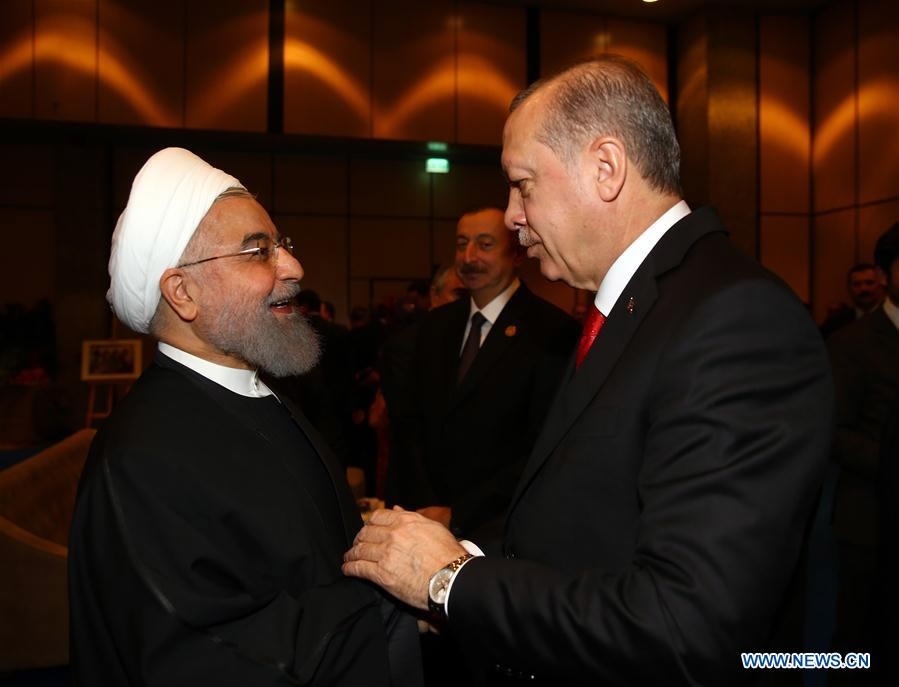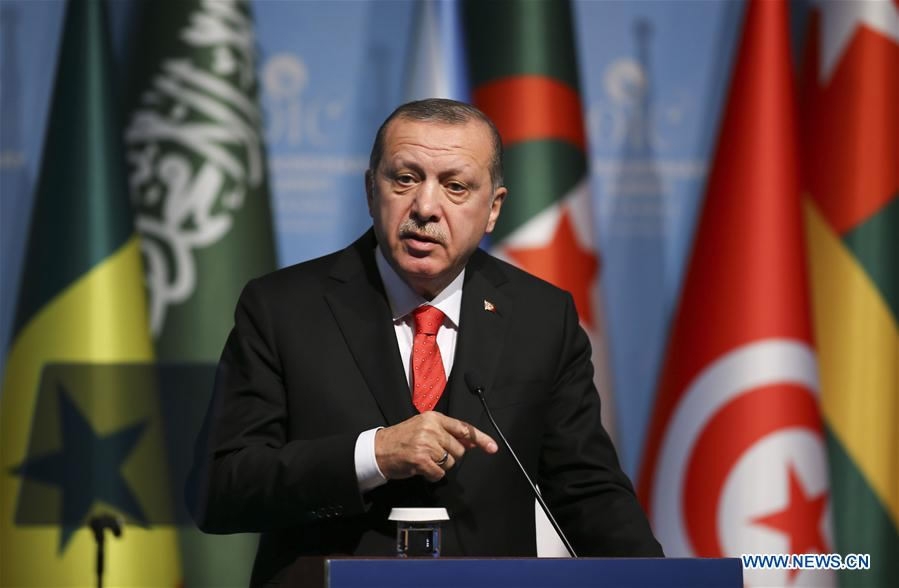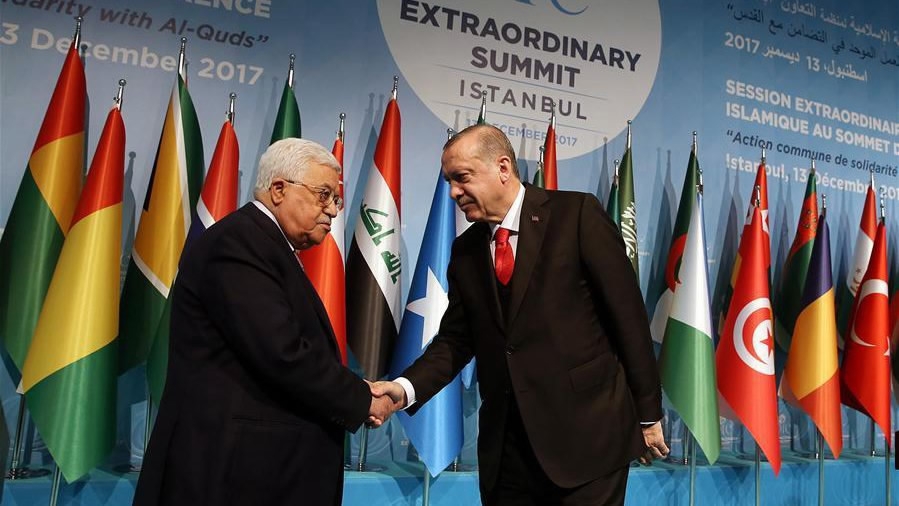Leaders of Muslim nations have joined forces in a rare show of unity to declare East Jerusalem the capital of Palestine, spurning US President Donald Trump’s controversial decision to recognize the disputed city as Israel’s capital.
Heads of states including Iran, Jordan, Kuwait and Qatar on Wednesday met at an emergency summit of the Organization for Islamic Cooperation (OIC) in Istanbul and rejected Trump’s declaration last week as “illegal,” calling it “an attack on the historical, legal, natural and national rights of the Palestinian people,” according to a final communique.

Turkish President Recep Tayyip Erdogan (R) talks with Iranian President Hassan Rouhani during the extraordinary summit of the Organization of Islamic Cooperation (OIC) in Istanbul, Turkey, on December 13, 2017. /Xinhua Photo
Turkish President Recep Tayyip Erdogan (R) talks with Iranian President Hassan Rouhani during the extraordinary summit of the Organization of Islamic Cooperation (OIC) in Istanbul, Turkey, on December 13, 2017. /Xinhua Photo
Trump broke with decades of stated US policy that asserted Israelis and Palestinians should determine the fate of the 5,000-year-old city as part of a negotiated, two-state solution. His call was welcomed by Israeli Prime Minister Benjamin Netanyahu, who sees it as an acknowledgement of his country’s vision of an undivided Jerusalem as its capital. Israel’s seat of government has been in West Jerusalem since the founding of the Jewish state in 1948.
But even some of Israel’s allies fear Trump’s declaration is premature and will inflame regional tensions, unleash violent extremism and make chances for Arab-Israeli peace even more remote, compounding Israel’s diplomatic isolation.
For decades, the United States, which has the world’s largest Jewish population outside of the Middle East, has had a monopoly in the Middle East peace process, facilitating a number of accords between Israelis and the Palestinians since World War II.

Palestinian President Mahmoud Abbas delivers a speech at a press conference after the extraordinary summit of the Organization of Islamic Cooperation(OIC) in Istanbul, Turkey, on December 13, 2017. /Xinhua Photo
Palestinian President Mahmoud Abbas delivers a speech at a press conference after the extraordinary summit of the Organization of Islamic Cooperation(OIC) in Istanbul, Turkey, on December 13, 2017. /Xinhua Photo
But several Muslim leaders have opposed Washington’s domination, seeing it as tipping the scales in favor of its close ally Israel.
Indeed, Palestinian leader Mahmoud Abbas said at the summit that his side no longer accepts the United States as a mediator and that the United Nations should instead lead efforts to forge peace.
Sidelining the United States in the Middle East peace process will reverberate throughout the region. It is likely to empower US rivals Iran and Russia, as well as NATO member Turkey, with whom US relations have soured in recent years, further diminishing Washington’s clout in the Middle East. Turkish President Recep Tayyip Erdogan, a pious Muslim who led the OIC summit, has long championed the Palestinian cause and lashed out at Israel, calling it a “terrorist” state.

Turkish President Recep Tayyip Erdogan delivers a speech at a press conference after the extraordinary summit of the Organization of Islamic Cooperation(OIC) in Istanbul, Turkey, on December 13, 2017. /Xinhua Photo
Turkish President Recep Tayyip Erdogan delivers a speech at a press conference after the extraordinary summit of the Organization of Islamic Cooperation(OIC) in Istanbul, Turkey, on December 13, 2017. /Xinhua Photo
It follows a US decision this year to stop training Syrian rebels fighting President Bashar al-Assad and back off of its push for him to step down, carving out space for Assad’s backers in Russia and Iran to craft a future political resolution of the six-year war without Washington.
The United States also seemingly betrayed its long-time allies the Kurds in northern Iraq after their ill-fated referendum for independence in September. The United States backed Kurdish autonomy for decades, but opposed its inevitable outcome of eventual independence, encouraging Tehran to support Baghdad in retaking vast tracts of territory that Kurds had claimed amid the chaos in Iraq in recent years.

Participants pose for a group photo during the extraordinary summit of the Organization of Islamic Cooperation (OIC) in Istanbul, Turkey, on December 13, 2017. /Xinhua Photo
Participants pose for a group photo during the extraordinary summit of the Organization of Islamic Cooperation (OIC) in Istanbul, Turkey, on December 13, 2017. /Xinhua Photo
Since the Cold War and its aftermath, the American public has by and large supported its government’s involvement in the Middle East, whether it was to check Iran and Iraq, thwart Islamic extremism, ensure access to natural resources and resolve the Arab-Israeli conflict.
Those priorities all remain, but Americans, weary of intractable war after US interventions in Afghanistan, Iraq, Libya and, indirectly, Syria, elected Trump in part because of his disdain for US foreign policy orthodoxy. Now, with the Middle East in the throes of a violent transformation US interventions helped spark, Washington is not only be abandoning its allies in the region, but forsaking its own interests.
As frustrating as their political and military setbacks have been, Americans are mistaken if they see the Middle East as a zero-sum game, in which Washington must either meddle constantly over its configuration or withdraw completely. Seeking broader consensus with both Arab and Israeli partners would allow it to maintain its clout without derailing decades of US diplomacy and unleashing even more instability in the world’s most volatile region.
(The author is a journalist who has covered Turkey for nearly two decades. The article reflects the author's opinion, and not necessarily the views of CGTN.)






